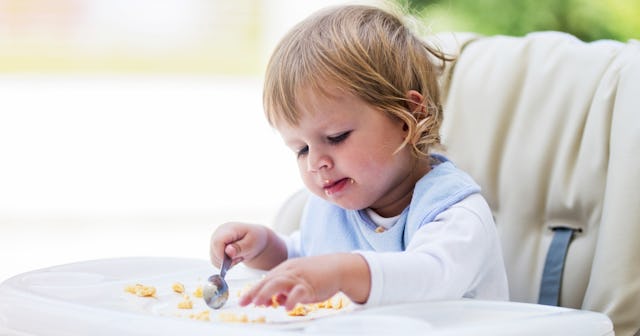Feeding Eggs To Your Baby Doesn’t Have To Be Scary — Here’s Why

Introducing new foods to your child can be a lot of fun — don’t get us wrong. However, knowing when to introduce certain foods, like eggs, to a baby can feel a little confusing. When can babies eat eggs? Is it safe? How soon is too soon? Could it lead to my baby developing an egg allergy? All of these questions are entirely natural (and understandable) to worry about, Mama. Worrying is like the spirit badge of motherhood, after all.
But, as it turns out, you may not have to stress about whether you should feed eggs to your baby as much as you might think. In fact, evidence over the past decade has shown that the sooner you get the ball (or rather, the egg) rolling, the better off your child may be.
At what age can babies have eggs?
A 2010 study conducted by The Journal of Allergy and Clinical Immunology concluded that introducing babies to cooked eggs early on (between the ages of 4 to 6 months) might reduce their chances of developing an allergy to it down the line. In the study, evidence showed that infants who had eggs incorporated into their diet after their first birthday actually had a higher risk of becoming allergic to them than the infants who were given eggs months earlier.
Yet, just like with anything else, there are a few factors you should consider when the time comes to give your baby eggs. It’s important to start off slow. When you’re beginning to give your baby eggs, keep things simple by turning the scrambled eggs into baby finger food. Cut them up into bite-size pieces. If your child is around eight to nine months or at a stage where they’re good at putting food into their mouths, this is a good starter meal for them.
How should you prepare the eggs?
The important thing to remember here is that you want to fully cook the egg before serving it to your little one. The best place to start would be to give your child just the egg yolk at first before introducing them to the whole thing. You can do this by separating the yolk from the egg and scrambling it up, or you could even hard boil the entire egg and mash just the yolk with some formula or breast milk. If that goes well, then it might be time to start cooking egg as the whole — though you’ll want to consult with your pediatrician about the idea first. Whenever you’re ready, there are plenty of easy egg recipes sure to please your little one’s palate.
If you’re looking for some quick egg recipes for your baby, we’ve gathered a few to get you started.
- Egg and Avocado on Toast: Both avocados and eggs are choc-full of nutrients and easy to spread. So mash a hard-boiled egg yolk with a slice of avocado and spread it on a multi-grain cracker.
- Egg Puree: Take the egg yolk and baby’s favorite fruit or vegetable (make sure it’s cooked) and mash it together. Veggies like sweet potatoes and broccoli are great places to start.
- Banana Egg Pancakes: Take a ripe banana, an enormous egg, and flour and mix it in a bowl. Then cook the mixture on a skillet like you would regular pancakes.
- Egg pudding: Eggs aren’t just for breakfast. Introduce eggs to your child in a sweet way. You will need a large egg, vanilla, half a cup of breast milk (or formula milk), and cinnamon. Mix these items together and then put them into a heatproof bowl to steam. Also, make sure you stir everything with a fork to avoid bubbles.
What if my child has an allergic reaction to eggs?
Even with this newfound research, there’s still always a possibility that your child has or could develop an egg allergy. According to the American College of Allergy, Asthma & Immunology, roughly two percent of children are allergic to eggs, though, luckily, around 70 percent of them outgrow the allergy by the time they turn 16. So while the odds are low, it’s always wise to be prepared just in case.
Symptoms of an allergic reaction include hives, swelling, diarrhea, vomiting, trouble breathing, and itchy, watery eyes, any of which would warrant a call to the pediatrician. The severity of the reaction may also depend on the number of eggs your child has consumed. So, when introducing eggs to your baby, start with small portions and increase accordingly as time goes on.
What are the benefits of introducing eggs to baby?
Though some of you may be tempted to postpone this whole egg discussion for another time, there are some great perks to adding this nutritious food into your baby’s system. For starters, eggs are a great source of protein, which will help your wee babe grow up to be big and strong. Then there’s the fact that it’s also super convenient since you can find eggs at pretty much any local grocery store. And, of course, you can use eggs to make other delicious meals for the whole family to enjoy, such as pancakes, French toast, and basically any other baked good.
Needless to say, eggs are a pretty vital food group to work into a kid’s eating rotation. And now that you know how to go about it, maybe the whole process won’t be so scary. Perhaps it’ll even be a little egg-citing. (OK, I’ll stop now.)
This article was originally published on